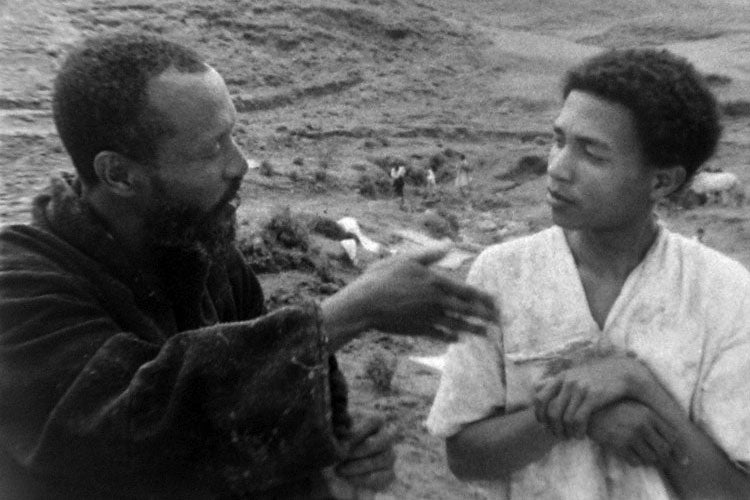You are here
Harvest: 3,000 Years

Director Haile Gerima’s first feature work to be set in Africa employs visions of his native Ethiopia to construct a post-colonial allegory of class exploitation. Filmed in the tumultuous days following the overthrow of Haile Selassie, the portrait of an abject peasant family toiling under the scornful eye of a wealthy landowner exhibits the spontaneity of a documentary. But it also displays the assuredness and authority of a master storyteller in the sweep of its conceptual rigor and moral stand.
We are exposed to several characters, as it were, without introduction. They are members of a poor family that rise and begin tending cattle and plowing fields. Their feudal lord, a Western-attired tyrant, barks orders and criticism from a seat on his shaded front porch. Another figure, meagerly dressed, calls out insults to the landowner. These almost archetypal figures take on more specific identities as we learn that the seeming madman once owned property now expropriated and held by the landowner, and that although the peasant family may toil dutifully, its members seethe with memories and visions of another way of life. In time, a critique of modern Ethiopia (and by implication, neocolonial Africa) emerges that criticizes coming political reconfigurations as just the latest way in which others may now exploit the land and the poor.
Gerima unfolds several loosely connected episodes (indeed, the “action” of the film often seems trained on an ever-more subtle understanding of certain facts of daily life, rather than on a plot), but the film also employs freewheeling shifts in register, such that political speeches in public spaces contrast with exclamatory addresses to the camera, and verbal abuse of workers alternates with fairly Buñuelian images of human beings being driven by a whip, with no qualification of the “reality” of any situation, all to the accompaniment of an evocative musical soundscape. When the “plot” finally offers its fulfillment, the effect is devastating. In this early work, Gerima strove for something more than an individual story, achieving a bracing polemic and an impassioned narrative of bleak and haunting beauty.
—Shannon Kelley
Film Credits
| Individual | Role(s) |
|---|---|
| Haile Gerima |
Director Producer Writer Editor |
| Eliot Davis | Cinematographer |
| Kasu Asfaw | Cast |
| Gebru Kasa | Cast |
| Worke Kasa | Cast |
To report problems, broken links, or comment on the website, please contact support
Copyright © 2025 UCLA Film & Television Archive. All Rights Reserved






 Mobile Navigation
Mobile Navigation

